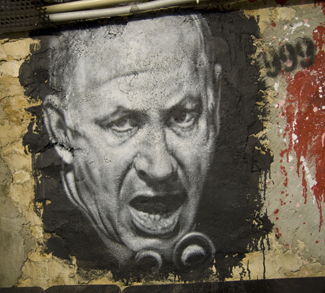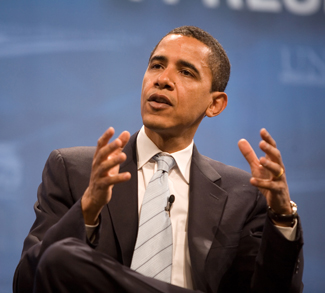Israel’s right-wing government has been falling over itself with glee since Donald Trump’s shock election victory.
Prime Minister Netanyahu has set the overall direction, heralding the arrival of what he calls a “new era” in relations between the two allies and penciling a first face-to-face with Trump for February.
Jerusalem’s hawkish mayor, Nir Barkat, has amped up his rhetoric, using a YouTube video to charge that Obama “surrendered to radical Islam” during his presidency.
Unfettered by the former administration’s watchful eye for only a matter of days, the Jerusalem Municipality he heads green-lighted the construction of 566 housing units over the Green Line.
The announcement was followed, two days later, by a much bigger one to add over 2,500 units to pre-existing settlements in the West Bank, among the largest construction announcements in the turbulent area since 2013.
In a reaction unprecedented in recent relations between the allies, the new administration kept mum on the move.
These initial developments, however, may only represent the tip of the iceberg of what could be to come.
Plans to legally annex Ma’ale Adumim, the open first step towards education minister Naftali Bennet’s fantasy of asserting Israeli sovereignty over all of area C in the West Bank, are on hold only until the bilateral in Washington next month. The proposal is rapidly gaining traction and enjoys support from virtually all the right-wing parties in addition to carrying the bullish PM’s imprimatur.
In the worst-possible-case scenario, Arab nations launch their first unified war against Israel since 1967.
And then there’s what could emerge as the straw that breaks regional stability’s back. Plans to action the campaign promise to move the US embassy from Tel Aviv to Jerusalem are well underway.
But what if…
Imagine the following:
Israel continues to take Trump’s ascent to power as carte blanche to act with a sense of unprecedented impunity in the West Bank.
Its government takes a series of increasingly daring unilateral steps that pits it even more squarely against international consensus than it already stands.
As soon as next month – in what would be the first annexation law to pass the Knesset since the Golan Heights Law of 1981 – parliament declares the Jerusalem commuter settlement of Ma’aleh Adumim and the E1 zone part of Israel proper.
This move is soon followed, as Bennett and the right crave, by annexation of the nearby settlements of the Gush Etzion bloc, the Jordan Valley, Ofra, and (significantly) the city of Ariel – a major population center far removed from the territory’s periphery.
As the tactic approval of the Americans continues to embolden the government, the Bill to annex all of area C becomes law, extending the final borders of the state eastwards as far as the Jordanian border.
At this point, what happens on the diplomatic front is anybody’s guess, but imagine, again, the following.
The tinderbox explodes…
The Palestinian street and leadership is forced to accept that the two state solution or any hope of Palestinian statehood is dead in the water.
The new facts on the ground – that 61% of the West Bank has been formally subsumed into Israel at the swipe of a pen – have driven the final nail in the coffin of the Oslo Accords as well as the entire two state process.
The parameters of any future Palestinian state are now necessarily limited to the disjointed and non-contiguous islands of areas A (the Palestinian cities), the rural villages of area B, co-administered by Israel, plus the coastal Gaza Strip, which remains a totalitarian theocracy under Hamas rule.
Even the far-left’s staunchest ideologues like Meretz and Bt’selem would be forced to admit: it’s simply not going to happen.
The US embassy moves to Jerusalem – and if they haven’t already done so by now – the Palestinians hold good on their threat to “unleash all weapons” on the US administration at the UN.
Palestinian social media floods with incitement demanding a popular jihad to counter not just the fictitious “threats to Al Aqsa” that sparked the nine month long knife intifada, but the “death-knell to all of Palestine” that the annexation has resulted in. A real third intifada is unleashed by a disenfranchised population numbering over two million who now feel that they have nothing left to lose.
Reaction to the seismically destabilizing events spreads like wildfire and arouses the sympathy of not just Israel’s neighbors but entire Arab World.
In the worst-possible-case scenario, Arab nations launch their first unified war against Israel since 1967.
This time, however, such a war could resemble a doomsday battle of Biblical Gog and Magog proportions, with armies and paramilitary state proxies spanning everyone from Hamas to ISIS joining forces to open fronts against Israel. Regular and unconventional threats come from Gaza, Lebanon, Egypt, Syria, and Jordan all at once.
Assuming Israel survives this onslaught, a series of right-wing proposals that have long been considered marginal or the exclusive preserve of the far right are now considered reasonable topics for discourse among a now-radicalized Israeli population.
Ideas like whether Israel should forcibly dismantle the PA or extend its annexation to the remaining Arab enclaves in the West Bank are made more palatable by both the renewed wave of violence Israel presumably faces and the unwavering support it receives from the Trump administration.
A change of mind…
Then, one day, President Donald Trump (or Jared Kushner, Trump’s property tycoon son-in-law that he’s certain will broker the world’s most intractable religiopolitical conflict) simply changes his mind about the whole Israel thing.
As domestic opposition to Israel’s annexation swells to bursting point, Trump pivots for populism and joins the masses. The US aligns itself with the now worldwide chorus of nations contemplating unprecedented measures against Israel. At the very least, unconditional support is off the table.
The sudden withdrawal of Israel’s military and diplomatic bulwark could make the days of Obama’s abstention at Resolution 2334 seem halcyon by comparison as the vaunted ‘new era’ in the ‘special relationship’ topples like a sandcastle.
A dangerous strategy…
The above is nothing but wild hypothesis based on a dramatic series of events that may not even come close to eventuating.
But to take President Donald Trump’s shock election as an example, crazier things have happened in the world of late.
The most right-wing government in Israel’s history is busily contemplating measures that would be both unprecedented and which would institute irreversible changes to its relationship with the Palestinians and the world.
In doing so, many or most among its ranks are relying on the support of a newly elected president. A president that by many observers’ reckoning seems deeply unstable in his foreign policy and worldview. In their eyes, Trump’s election has provided a window of opportunity eight years in the waiting to drop a thin veneer of commitment to the two state solution. For them, Trump’s election is a historical opportunity to finally put the Israeli-Palestinian conflict to bed in Israel’s favor.
Predicating their most far-reaching ambitions to do so on Donald Trump’s support, however, is a recklessly dangerous strategy.
A lot will presumably change in the region’s politics over the coming six months.
For Israel, however, one possibility should be cause for real concern: that Trump’s unconditional support for its politics will one day prove to be a Trojan horse that will take it – and the entire world – by surprise.
The opinions, beliefs, and viewpoints expressed by the authors are theirs alone and don’t reflect any official position of Geopoliticalmonitor.com.




